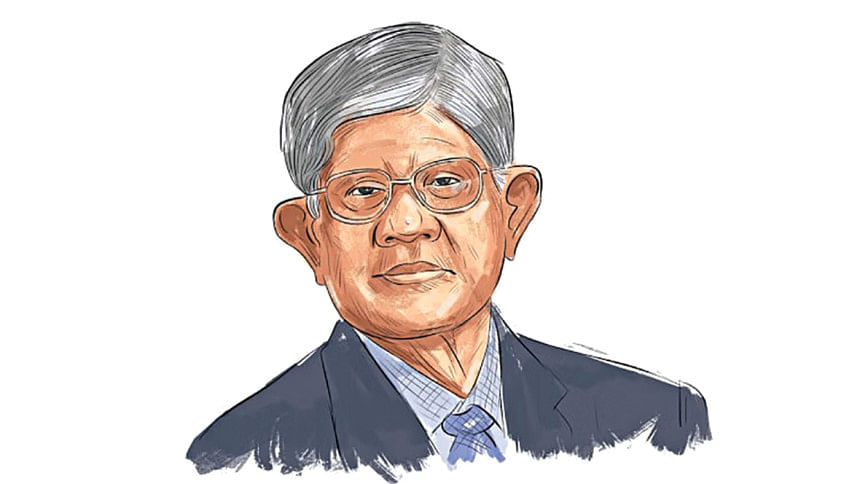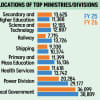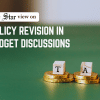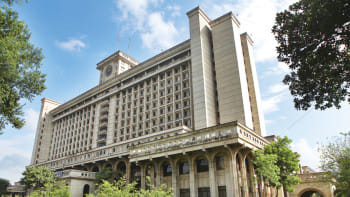Star Interview: Betting on a leaner budget

Bangladesh's interim government is preparing a tighter budget to rein in the fiscal deficit while boosting job creation and stabilising the economy amid mounting debt concerns.
"It's not that we won't borrow from foreign and local sources, but we'll bring the amount down," Finance Adviser Salehuddin Ahmed said in an exclusive interview with The Daily Star on Sunday.
A key objective is to reduce the country's debt risk from "moderate" to "lower", Ahmed said, adding, "We'll try our best to reduce the budget deficit significantly."
While cutting administrative expenses is difficult, the government plans to curb expenditure by dropping large, capital-intensive infrastructure projects. Ahmed said the government would avoid costly ventures like Payra Port, which requires Tk 200 crore in annual dredging with limited returns. However, select investments such as the Bay Terminal and the metro rail, each costing around $700-800 million, will move forward.
The government aims to place greater emphasis on labour-intensive development activities, such as roadwork and river excavation, to stimulate the rural economy. "We're looking at projects where local labour will be involved and the money will circulate at the local level. That's how we'll generate employment," said Ahmed, referring to his discussion with Chief Adviser Muhammad Yunus.
"We want employment to happen in agriculture and smaller projects, so the pressure on the budget will be less," he said.
In parallel, Bangladesh Bank is placing special focus on providing targeted loan schemes to support women's participation in the economy.
The forthcoming budget will also take a "business-friendly" approach, according to Ahmed. "We'll try to encourage the private sector. We also want to graduate to a phase that increases competitiveness."
Revenue mobilisation will be strengthened through a sweeping review of tax exemptions. "There are many exemptions, waivers given. Many charitable organisations -- we've cut all tax exemptions," he said. "We'll recognise genuine charitable organisations and hospitals, but the rest will go. That will generate significant tax revenue."
On value-added tax, Ahmed confirmed that the standard 15 percent VAT rate will remain in place, but some flexibility will be introduced. The government plans to lower VAT for production-oriented sectors to keep costs down. For the service sector, such as restaurants, he argued, VAT is more affordable. "If someone spends Tk 500, they can pay VAT," he said.
The budget will also address broader social and developmental goals. "We'll increase spending in education, health, and social safety nets," said Ahmed. "We're putting an emphasis on self-employment. Not everyone will just look for jobs -- those who are motivated should be able to create their own livelihoods."
The next budget will make a symbolic shift by recognising the role of domestic workers. "We'll mention domestic workers in the budget. They are part of the productive force. Their contribution hasn't been counted so far, but if we monetise it, it will be quite significant," Ahmed said, adding that formal GDP inclusion might happen in future.
Inflation, while still elevated, is expected to ease in the coming months. "Inflation is now decreasing, though slowly," he said. "We hope it will come down to 6.5 percent next year."
The budget will be televised on June 2. A public feedback period will follow, allowing possible revisions before it is finalised and enacted through an ordinance. Some budgetary measures will take effect immediately.
To support its fiscal programme, the government expects to secure approximately $3.5 billion in budget support from global lenders by June or July. That includes $1.3 billion from the International Monetary Fund. The total excludes project loans, Ahmed clarified.
In the infrastructure pipeline, the Rooppur nuclear power project is nearing completion. "Rooppur is more than 80 percent complete, and uranium is already in storage," Ahmed said, adding that trial generation is expected to begin by September or October, with one unit slated to become fully operational by year-end. The second unit has reached roughly 60 percent completion.
Ahmed also stressed that the interim government intends to leave behind lasting institutional reforms for the next administration. "One footprint is the NBR -- we've split it. That won't be reversed."
He pointed to several key structural reforms introduced through new ordinances. One outlines how troubled banks can be restructured or liquidated to safeguard depositors. "The ordinance aims to ensure that people's savings and deposits are protected, and that there's a clear process for returning them," said Ahmed.
Another ordinance aims to improve transparency in the public accounts of authorities. A separate regulation ensures that official statistics are published without political interference. "There will be a committee; they will work independently; nobody will interfere with the figures they provide," Ahmed said.

 For all latest news, follow The Daily Star's Google News channel.
For all latest news, follow The Daily Star's Google News channel. 








Comments